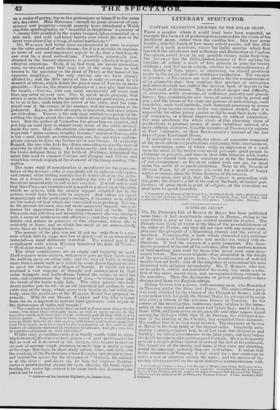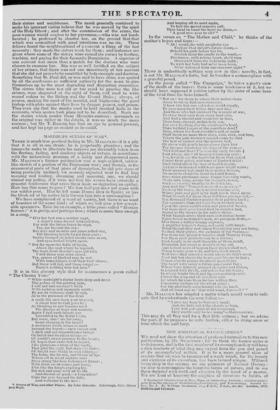SCIPIO DE RICCI.* •
MR. DE POTTER'S Life of Scipio de Ricci has been published sonic time: it had considerable success in France, owing to the rage which a year or two ago existed against the Jesuits. The French were dying of terror at the idea of the re-establishment of the order in France, and they did not view with any greater com- placency the prospect of a flourishing church and the revival of monkery. Consequently, a book which abounded with evidence of the crimes of former jesuits and monks was hailed with en- thusiasm. It had the success of a party pamphlet. The docu- ments amassed at the end of the volumes, after the modern fashion of bookmaking, were read by those who never read such docu- ments before. The reason is plain—they abounded in the details of the peccadilloes of pious nuns ; the licentiousness of well-fed monks was set forth ; and all the iniquities of conventual life were described with religious scrupulosity. Mr. T. RoscoR, who has, as he calls it, edited, not translated the work, has made a selec- tion of the more decent vices, anti incorporated these extracts in the narrative. Thus the documents or pieces justificatives have disappeared from the English edition.
Bishop SCIPIO was a pious, well-meaning man, who flourished in Tuscany under the three last Popes. His conscientious piety was early shocked by the abuses of the Church of Rome ; and in conjunction with Leopold, the Grand Duke, he attempted to carry into effect a reform of the religious houses of Tuscany. In the course of his investigation, numerous facts relative to the immo- rality of the monks and nuns were laid before him ; and it is from those MSS. and from notes on his own life and other papers found among the Bishop's MSS. that M. de POTTER, the celebrated au- thor of the History of the Church, has compiled these Memoirs. We confess that to us they want interest. The character of Sciew de Ricci is far from being of the highest order. Originally actu- ated by a strong religious zeal, he at last sunk into feebleness and timidity : he signed a recantation in his later years, and long before his death became in all respects a good Catholic. He was frequently seen for a length of time bathed in tears at the feet of his confessor. The anecdotes of the monks and nuns, if they were not shocking, would be amusing : certainly they are instructive. It seems that in the nunneries of Tascany, it was usual for a new confessor to select a wife or mistress among the nuns ; and the monks of the vicinity always carried on the most unlimited communication with M'erwirs of Scipio de Ricci, late Bishop of' Pistoia and Prato, Reformer of Ca- tholicism in Tuscany under the reign of Leopold. Compiled from the Autograph 11185. uf that Prelate, and the Letters of other distinguished Persons of his Times ; edited from the original of M. de Potter,by Thomas Roscoe. 2 vois. London, 1820- Whom, their sisters and neighbours. The monk generally contrived to make his ignorant victim believe that he was moved by the spirit of the Holy Ghost ; and after the commission of the crime, the poor woman would confess to her paramour,—who was not hard- hearted ; he professed to absolve her, on the ground that that which was committed with good intentions was no sin. These fellows found the neighbourhood of a convent a thing of the last necessity: they made the sisters wash for them ; and instances are given where some of the sisters were ruined (in purse) by feeding, washing. and paying for their favourite Dominican. A superior of one convent was more than a match for the doctors who were chosen to examine her. She was so well fortified on the subject of her crimes, that there was not one monstrosity of her convent that she did not prove to be sanctified by holy example and doctrine. Something that St. Paul did, or was said to have done, was quoted by all the confessors as sufficient authority for the nuns to give themselves up to the most degrading and disgusting enormities. The sisters who were too old or too good to practise the like crimes, were disgusted at the sight of them, and used to write round robins to the Bishop and the Grand Duke ; always, of course, making the most of the scandal, and frightening the good bishop with plots against their lives by dagger, poison, and prison. They even say that the monks used to hold masked balls in the convents, when scenes took place not to be described. Such are the stories which render these Memoirs curious : inasmuch as the original was richer in the details, it was so much the more curious ; but Mr. T. ROSCOE has had an eye to general perusal, and has kept his page as modest as he could.



















 Previous page
Previous page